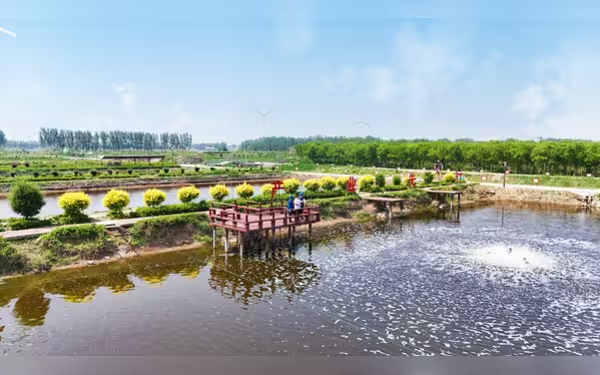Friday, November 8, 2024 11:47 AM
State Grid Dezhou Powers Rural Revitalization in Wang Shiying Village
- Wang Shiying Village excels in loach breeding technology.
- Innovative aquaculture methods boost production significantly.
- Partnership with South Korean group enhances local economy.
 Image Credits: en_prnasisa
Image Credits: en_prnasisaState Grid Dezhou Power Supply Company supports Wang Shiying Village's loach breeding, enhancing rural revitalization and economic growth.
In recent years, rural revitalization has become a focal point for development in many regions, including China. One shining example of this initiative is Wang Shiying Village, located in Chaihudian Town, Ningjin County, Dezhou City, Shandong Province. This village has emerged as the largest independently developed loach breeding base in Dezhou City and has been recognized as a national benchmark for loach breeding technology. The village's success story is a testament to how integrating various industries can lead to prosperity and improved living standards for rural communities.
Wang Shiying Village has adopted a unique approach to enhance its economy by combining agriculture, industry, and services. This integrated development strategy has not only beautified the village but has also fostered industrial growth, strengthened community ties, and increased public wealth. The village's characteristic loach breeding industry has played a pivotal role in this transformation, allowing it to explore new avenues for economic growth.
To boost aquaculture production, the village has pioneered indoor ecological circular aquaculture. This innovative method, along with the development of a smart fishery system, has led to a remarkable increase in production—up to 20 times in the same area. As the breeding season for loaches is critical, ensuring a continuous power supply is essential for the success of this venture.
On September 31st, employees from the Chaihudian Power Supply Station of State Grid Dezhou Power Supply Company took proactive measures to support the village's aquaculture efforts. They inspected the power supply lines, assessed the power consumption needs of the breeding base, and replaced any damaged equipment. This commitment to maintaining a reliable power supply is crucial for the ongoing success of the loach breeding operations.
In a significant move to further enhance the loach industry, Wang Shiying Village has partnered with South Korean Mingjun Group to launch a loach deep processing project. This ambitious project, with a total investment of 100 million yuan, will install two fully automatic production lines capable of processing 8,000 tons of loach food annually. The expected outcomes are impressive, with projected annual sales revenue exceeding 300 million yuan and a net profit of over 75 million yuan. Additionally, this project is anticipated to increase the village's collective income by over 700,000 yuan and create job opportunities for 80 villagers.
State Grid Dezhou Power Supply Company is dedicated to ensuring that the power supply remains uninterrupted, which is vital for the village's agricultural production. They are actively working on transforming and upgrading rural power grids, optimizing the power grid architecture, and enhancing the reliability of power supply. This includes building and renovating over 200 meters of low-voltage cable lines and 200 kilovolt ampere transformers.
As Chen Xuyong, the Secretary of the Party Branch of Wang Shiying Village, aptly stated, "After the completion of the power grid renovation in the village, on the basis of loach farming, our village raised funds to build a 78-acre locust breeding base, which can drive the village collective to increase annual income by 150,000 yuan. The days are getting better and better." This sentiment reflects the positive changes taking place in the village, showcasing how a reliable power supply and innovative agricultural practices can lead to a brighter future for rural communities.
The story of Wang Shiying Village serves as an inspiring example of how rural revitalization can be achieved through collaboration, innovation, and a steadfast commitment to progress. By leveraging local resources and fostering partnerships, rural areas can not only enhance their economic prospects but also improve the quality of life for their residents. As more villages follow this path, the potential for widespread rural development becomes increasingly promising.













